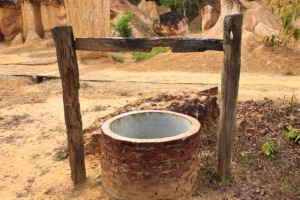Clean water, a resource that many people in developed countries take for granted, is a luxury in certain parts of the world. According to the United Nations Department of Economic and Social Affairs, more than 300 of the 800 million residing in sub-Saharan Africa live in water-scarce environments. Without access to safe drinking water, diseases linked to poor hygiene, improper sanitation, and contaminated water develop.
By building wells in Africa, charities like The Last Well are able to provide families with access to clean water. However, it takes money to build these wells. Learn how much it costs to build a well and how you can get involved with this urgent cause.

Building Wells in Africa
It is a common question often asked by people interested in helping out financially with the clean water initiative. How much does it cost to build a well in Africa? The short answer is it depends. There are many factors that affect the cost of a well, such as the materials used, depth of the well, the type of pump used, labor expenses, and how far the village is from a water source.
The process begins with a village committee meeting in which paramount village individuals, such as the village headman or headwoman, come together to express their interests in building a well. Together, the committee will determine where the well should be built for easy access, which individuals will be responsible for maintaining the well, and how the village can maximize the lifespan of the well. Once an optimal site has been found, a well is drilled to about 50 feet (15 meters) below the aquifer level. A casing is then installed to prevent it from collapsing and to keep out dirt and debris.
It is important for wells to meet certain safety regulations. Before a well can be used by a village, a temporary pump is used to monitor the quality and output of the well water. If the water is found to meet regulations, a hand pump is installed which allows community members to access clean water as needed. To help ensure that the well lasts, the community receives important information regarding hygiene and sanitation practices. The village committee is also provided with training on how to properly use and maintain the well. If a component breaks or the well experiences a mechanical malfunction, committee members have the tools and knowledge to properly repair it.
While the cost of a well can vary based on the factors previously mentioned, the average cost per well for The Last Well in Liberia is $3,000 USD. This price not only includes the cost to physically build the well, but also to provide the village with vital information that helps ensure that the well continues functioning as it should and that village residents follow hygienic practices that cut down on the number of water-related diseases and illnesses. Each well that is built in Africa serves approximately 2,000 people and lasts about 20 years.
How You Can Get Involved
While the water crisis affects numerous countries throughout Africa, Liberia has experienced one of the worst water and sanitation issues. Liberia sustained a 14 year stretch of war that destroyed all energy and water infrastructure. While the Second Liberian Civil War ended in 2003, the country has yet to reverse much of the damage caused. But even if you are not able to physically go to Africa to help build wells, there are things you can do to help this important cause.
By donating to charities for Africa, such as The Last Well, you can make a major difference in the lives of millions of Africans who do not yet have access to safe, clean drinking water. A monthly donation can help one, two, or multiple villages collect the money they need to build a well. If you are unable to provide a monthly donation, you may also want to consider a one-time donation. By sponsoring a child, a family, or an entire village, you can help diminish water-borne illnesses and help provide people in Africa with clean water for drinking, bathing, and sanitation.
Contact The Last Well
One of the biggest challenges that affect both urban and rural communities across Liberia is the lack of safe drinking water. Sub-Saharan Africa suers from significant levels of water stress, more than many other regions in the world. Building wells in locations like Liberia help provide residents with access to safe, clean drinking water while lessening the burden on women and girls who are responsible for collecting water. For more information about water scarcity in Africa or to learn how you can get involved with this cause, contact The Last Well.







